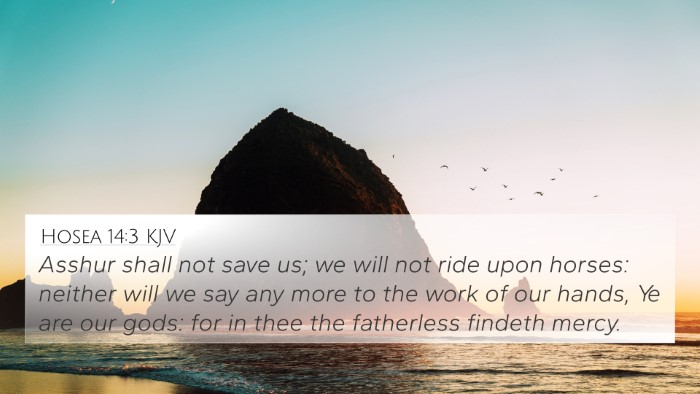Old Testament
Genesis Exodus Leviticus Numbers Deuteronomy Joshua Judges Ruth 1 Samuel 2 Samuel 1 Kings 2 Kings 1 Chronicles 2 Chronicles Ezra Nehemiah Esther Job Psalms Proverbs Ecclesiastes Song of Solomon Isaiah Jeremiah Lamentations Ezekiel Daniel Hosea Joel Amos Obadiah Jonah Micah Nahum Habakkuk Zephaniah Haggai Zechariah MalachiHosea 5:13 Similar Verses
Hosea 5:13 Cross References
When Ephraim saw his sickness, and Judah saw his wound, then went Ephraim to the Assyrian, and sent to king Jareb: yet could he not heal you, nor cure you of your wound.
Uncover the Rich Themes and Topics of This Bible Verse
Listed below are the Bible themes associated with Hosea 5:13. We invite you to explore each theme to gain deeper insights into the Scriptures.
Hosea 5:13 Cross Reference Verses
This section features a detailed cross-reference designed to enrich your understanding of the Scriptures. Below, you will find carefully selected verses that echo the themes and teachings related to Hosea 5:13 KJV. Click on any image to explore detailed analyses of related Bible verses and uncover deeper theological insights.

Hosea 7:11 (KJV) »
Ephraim also is like a silly dove without heart: they call to Egypt, they go to Assyria.

Hosea 12:1 (KJV) »
Ephraim feedeth on wind, and followeth after the east wind: he daily increaseth lies and desolation; and they do make a covenant with the Assyrians, and oil is carried into Egypt.

Hosea 10:6 (KJV) »
It shall be also carried unto Assyria for a present to king Jareb: Ephraim shall receive shame, and Israel shall be ashamed of his own counsel.

2 Kings 15:19 (KJV) »
And Pul the king of Assyria came against the land: and Menahem gave Pul a thousand talents of silver, that his hand might be with him to confirm the kingdom in his hand.

Hosea 8:9 (KJV) »
For they are gone up to Assyria, a wild ass alone by himself: Ephraim hath hired lovers.

Jeremiah 30:14 (KJV) »
All thy lovers have forgotten thee; they seek thee not; for I have wounded thee with the wound of an enemy, with the chastisement of a cruel one, for the multitude of thine iniquity; because thy sins were increased.

Hosea 14:3 (KJV) »
Asshur shall not save us; we will not ride upon horses: neither will we say any more to the work of our hands, Ye are our gods: for in thee the fatherless findeth mercy.

2 Kings 16:7 (KJV) »
So Ahaz sent messengers to Tiglathpileser king of Assyria, saying, I am thy servant and thy son: come up, and save me out of the hand of the king of Syria, and out of the hand of the king of Israel, which rise up against me.

2 Chronicles 28:20 (KJV) »
And Tilgathpilneser king of Assyria came unto him, and distressed him, but strengthened him not.

2 Kings 15:29 (KJV) »
In the days of Pekah king of Israel came Tiglathpileser king of Assyria, and took Ijon, and Abelbethmaachah, and Janoah, and Kedesh, and Hazor, and Gilead, and Galilee, all the land of Naphtali, and carried them captive to Assyria.

Micah 1:9 (KJV) »
For her wound is incurable; for it is come unto Judah; he is come unto the gate of my people, even to Jerusalem.
Hosea 5:13 Verse Analysis and Similar Verses
Understanding Hosea 5:13
Hosea 5:13 states: "When Ephraim saw his sickness, and Judah saw his wound, then went Ephraim to the Assyrian, and sent to king Jareb: yet could he not heal you, nor cure you of your wound." This verse encapsulates the dire situation of Israel (represented by Ephraim) and Judah, showing their misguided attempts to seek help from foreign powers rather than turning to God.
Verse Explanation
This passage reflects themes of desperation and futility in coping with national decline. Both Ephraim and Judah, upon recognizing their ailments (spiritual and physical), turn to the Assyrians. This signifies a crucial moment in their history where they relied on inadequate human resources, abandoning their divine support.
Insights from Commentaries
- Matthew Henry: He emphasizes the folly of seeking help from Assyria, noting that it is a poor substitute for divine assistance. Our troubles should lead us back to God, not to worldly allies.
- Albert Barnes: Barnes posits that Ephraim and Judah’s actions highlight a broader theme in the scriptures, where reliance on others leads to disappointment. He urges readers to understand the consequences of misplaced trust.
- Adam Clarke: Clarke points out the symbolic significance of the 'wound' and 'sickness,' linking it with the moral and spiritual decay of the nation. He further explains that healing cannot come from external sources if internal repentance is absent.
Cross-Referencing Biblical Texts
Hosea 5:13 serves as a poignant reminder within the wider narrative of scripture. Here are some Bible verse cross-references that reinforce its themes:
- Isaiah 30:1-3: Highlights Israel's rebellion and the futility of seeking assistance from Egypt.
- Psalms 146:3: Warns against putting trust in princes or mortal men for salvation.
- Jeremiah 17:5: Curses the one who trusts in man, emphasizing reliance on God.
- Hosea 14:3: Points to returning to the Lord for healing and restoration.
- Micah 5:1: Discusses the vulnerability of Israel and their reliance on foreign nations.
- 2 Kings 16:7-8: Describes King Ahaz's alliance with Assyria, a practical application of Hosea's admonition.
- Isaiah 41:6-7: Addresses the futility of dependence on idols and how men can fail in providing true help.
Thematic Connections
The themes present in Hosea 5:13 connect with several overarching biblical narratives, including:
- Trust in God vs. Human Alliances: This major theme underlines various accounts in the Old Testament where reliance on God proves fruitful compared to alliances with foreign nations.
- The Nature of Repentance: The condition of Ephraim and Judah reflects a general biblical call for repentance before seeking divine healing.
- Consequences of Sin: The verse encapsulates the fallout of abandoning God for worldly affiliations, serving as a warning throughout the scripture.
Applying the Insights
For readers seeking understanding, this analysis encourages a reflective approach to Bible verse interpretations and the importance of cross-referencing Biblical texts. By examining connections between Bible verses, believers deepen their understanding of how scripture relates to their spiritual lives.
Additionally, using tools for Bible cross-referencing like a Bible concordance or a cross-reference Bible study guide can enrich one’s study and application of biblical teachings.
Conclusion
In conclusion, Hosea 5:13 stands as a powerful reminder of the pitfalls of misplaced faith and the significance of trusting in God for healing and restoration. As we explore these Bible verse parallels and engage in comprehensive Bible cross-reference materials, we cultivate a deeper appreciation for God’s word and the wisdom it offers for navigating life's challenges.




